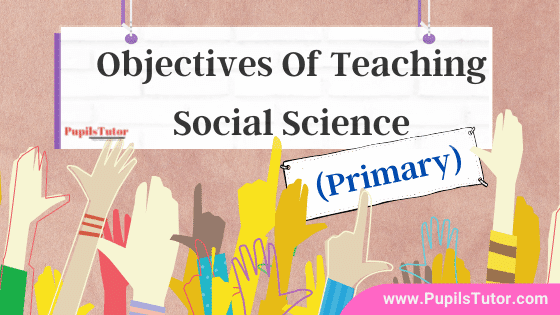
Objectives Of Teaching Social Science At Primary Level
The following may be outlined as the instructional objectives of social studies at the primary stage of education:
A. Understanding
- Man for all time seeks the help of others in meeting his needs. The basic needs of man all over the world are the same:
- Food
- Clothes and
- Shelter.
- Man’s life on earth is intimately connected with his physical environment. An essential prerequisite for a smooth and peaceful life in society are:
- A sense of responsibility
- Mutual cooperation
- Trust
- Goodwill and so on.
- Life is made possible by the usage of physical resources (example: water, minerals, soil, forest, etc.) and to put them to the best possible use and conserve them is the utmost duty of mankind.
- To make the world interdependent on one another and to
- Show the same respect to the people of each country.
- Honor the difference in their religious beliefs and faith.
- To acknowledge the shared contribution for the betterment of humans and the world by every nation.
Life is impossible without mutual aid as we breathe in a society where we have to rest on each other for our needs. There is a great diversity in different nations but all are a part of one world.
Objectives Of Teaching Social Science To Understand About India:
India has its own unique challenges and has a culture of its own.
- In the Democratic Republic of India, all citizens have equal rights and duties. There is a great diversity among the people in the different parts of the country with respect to:
- Languages,
- Religious beliefs
- Food habits,
- Dresses,
- Customs. etc.
- To cherish certain values in order to preserve and modify our culture and values.
- In spite of all the differences, we all are Indians and make one nation, we should understand these fully.
Check 👉 Social Science In India
B. Attitudes
- Respect for people of distinct
- Religions,
- Communities,
- Languages and
- Occupations.
- Trust in international laws, understanding, and cooperation.
- Respect and pride for national
- Objectives,
- Law,
- Values and
- Symbols.
- Empathy for the poor, migrants, and the vulnerable.
- Keen desire to preserve country’s independence and faith in country’s unity.
- Appreciations of natural beauty.
- Willingness to share the responsibility to preserve personal or government property and the nature of the country.
- Respect for teachers and elders.
- Self-reliance and awareness towards change.
C. Information
-
Important facts about the lives and contributions of great men such as:
- Mahatma Gandhi,
- Socrates,
- Lincoln,
- Lenin etc.
-
Important facts about the discoverers and Scientists Like
- Newton,
- Aryabhata,
- Columbus,
- Galileo,
- Einstein etc.
- The globe and map of the world.
- Ways of living in the different parts of the globe.
-
Important facts about the world agencies like:
- United Nations,
- UNICEF,
- WHO,
- UNESCO etc.
-
Important fact about Indian
- Heritage
- Religions,
- Monuments,
- Handicrafts,
- Music and Dances,
- Festivals,
- Scripts,
- Languages etc.
-
To know about various Indian:
- Rulers,
- Reformers,
- Saints,
- Poet,
- Writers,
- Scientists etc.
-
To know about India
- Physical divisions,
- Resources,
- Transport etc.
-
Important facts about the people of India
- National symbols,
- Festivals etc.
-
How we govern ourselves:
- Fundamental rights,
- Directive principles and
- Duties of a citizen.
D. Skills
-
While taking part in meetings and working in group children should be made to:
- Express themselves clearly and logically through speech or writing.
- Take part in meetings, debates, dramas, and other activities actively and work systematically.
- Listen to others with due respect and attention.
- Gather information from unique sources
- To present it,
- To use it and
- To write a brief report.
- Use respectful language during conversation and speak in one’s turn.
- To be able to:
- Ensure assigned responsibilities.
- Cooperate with others.
- To be able to lead others.
-
While using maps, charts graphs and globes children should be able to:
- Read easy and simple charts and graphs.
- Know and understand the meaning of colors and symbols used in maps.
- Understand the difference between a globe and a map.
- Locate different places on the map.
- Read directions on the map.
- Make simple charts and models.
- Measure the distance between two places on the map.
- Arranging the album, flowers, pictures, leaves, and newspaper clippings.
-
While visiting important places in the neighborhood children should:
- Be courteous and respectful towards others.
- Willingly participate in tours and getaways.
- Understand the basic rules like following traffic signs and traffic rules.
- Cooperate and share things with others.
Tags:
Objectives Of Teaching Social Science At Primary Level Notes
Explain Instructional objectives of teaching social study at primary stage – Understanding, Attitudes, Information, Skills Notes For B.Ed In English Medium
Why should we teach social science at primary level? Notes And Study Material, PDF, PPT, Assignment For B.Ed 1st and 2nd Year, DELED, M.Ed, CTET, TET, Entrance Exam, All Teaching Exam Test Download Free For Pedagogy of Social Studies And Teaching of Social Science Subject.
Important Questions For Exam:
Why should we teach social science at primary level?
Explain the objectives of teaching Social science at primary level.
Describe the objectives of teaching of Social science in primary schools.
Brief the aims and objectives of teaching Social Studies in primary schools.
Enumerate the aims and objectives of teaching of Social Scienceat primary stage.
Check Also:


Share You Thoughts And Suggestions In The Comment Box